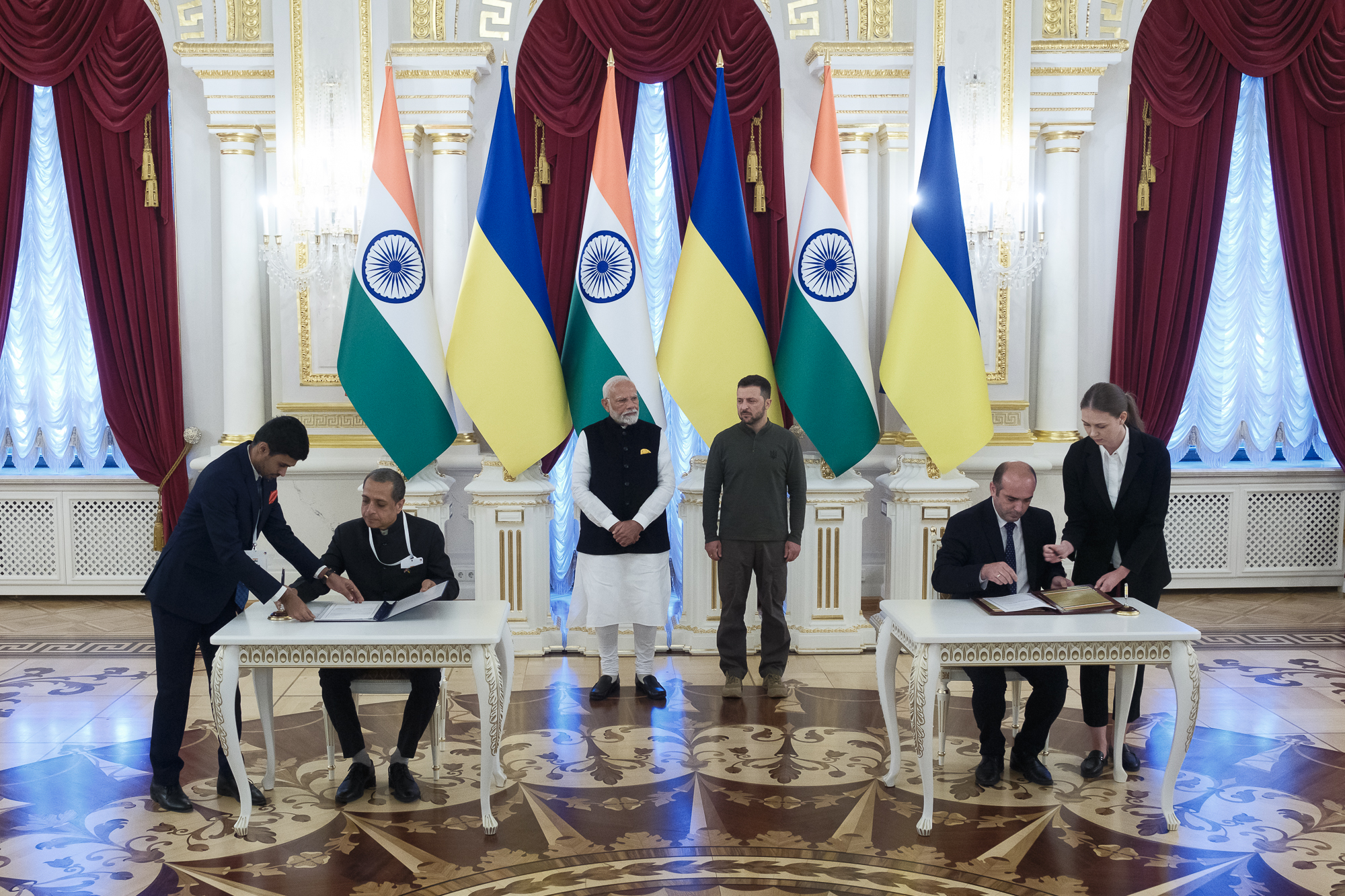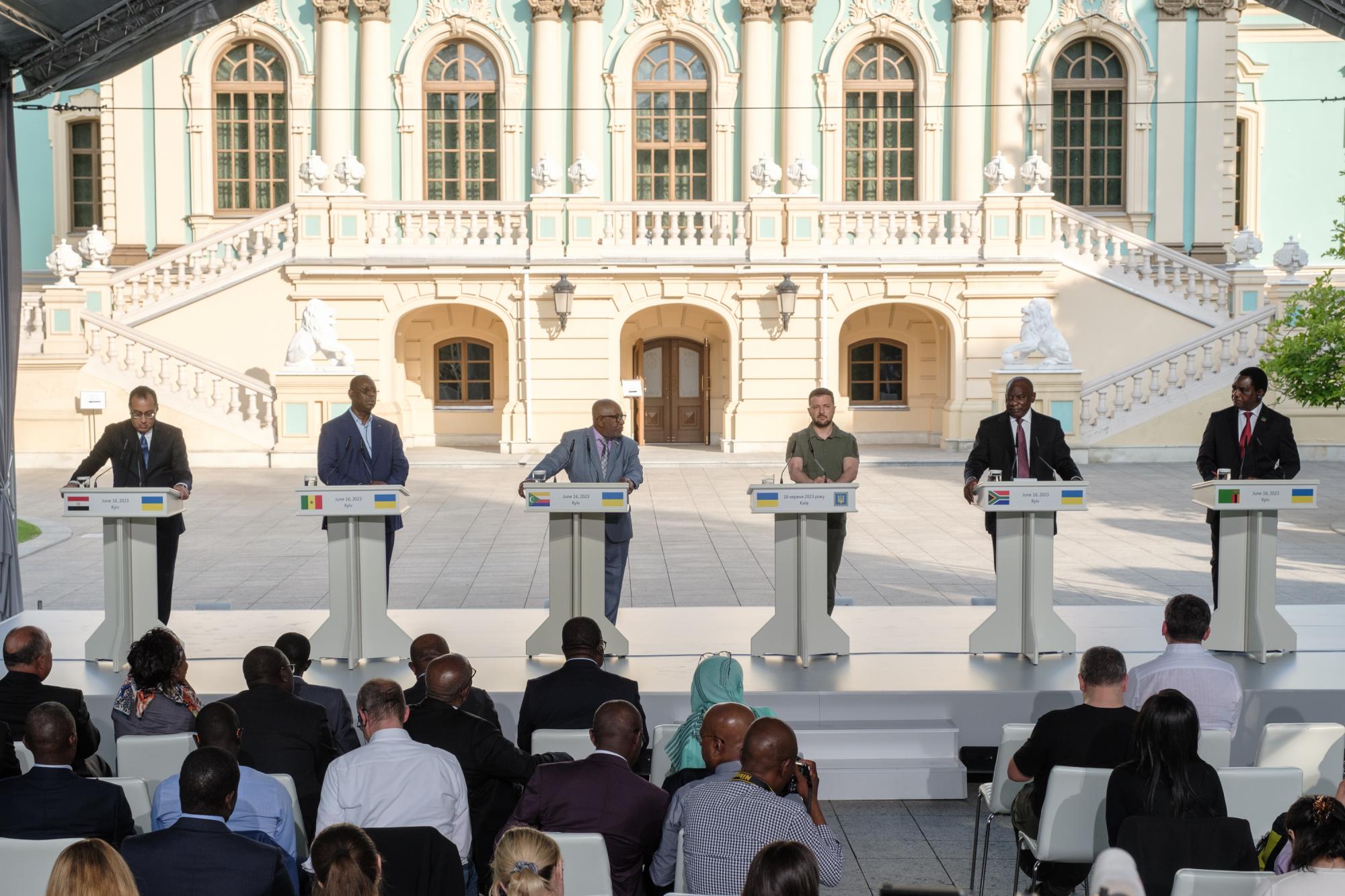Course to the South: How Ukraine is countering Russia's influence in India, Brazil, and Africa.
The article by RBC-Ukraine journalist Roman Kot explores the effectiveness of Ukraine's engagement with countries in Africa, Asia, and Latin America, examining whether it can counter Russian propaganda in these regions and if Ukrainian messages about the war are reaching audiences in the Global South.
TABLE OF CONTENTS
- India: Pragmatic Interests and Moral Considerations
- Africa: Food and Security
- Brazil: Common Issues and Their Solutions
Since the onset of Russia's full-scale invasion, Ukraine has significantly intensified its connections with countries in the so-called Global South – in Africa, Asia, and Latin America. As Ukrainian diplomats have repeatedly acknowledged, prior to this, Ukraine's foreign policy barely ventured beyond the polygon of Washington-London-Paris-Berlin-Brussels-Warsaw.
A number of factors have contributed to this "pivot to the South." This is not solely driven by the need to seek support for diplomatic initiatives like the "Peace Formula." Asia is evolving into the world's most economically developed region. Africa and the Middle East remain crucial markets for Ukrainian agricultural products. At the same time, their stability is vital for the entire Europe in the context of migration. Latin America is somewhat more distant from us, but a couple of dozen countries in the region hold significance with their voices in international organizations and their natural resources.
During the recent conference "Crimea Global 2024. Understanding Ukraine through the South" held in Kyiv, RBC-Ukraine spoke with experts from the Global South about how effectively Ukraine communicates with their countries, whether it is succeeding in winning them over, and how it counters the traditionally present Russian influence there.
India: Pragmatic Interests and Moral Considerations
India is one of the largest economies in the world, a nuclear power with global ambitions, and a country that many other nations in Asia and Africa look to. Due to its long-standing ties with Russia since the Soviet era, India has become dependent on Russian arms. Following the start of Russia's full-scale invasion, India emerged as one of the largest buyers of oil from the Russian Federation.
However, India is openly not supportive of Russia; rather, it seeks to benefit from Russia's weakening, as noted by Swasti Rao, a research fellow at the Europe and Eurasia Center of the Institute for Defense Studies and Analyses in India. A clear example of this approach is the purchase of cheap Russian oil.
"India never bought Russian oil before the war in Ukraine. We sourced oil from the Gulf countries. When the war began and sanctions were imposed against Russia, Russia sought to reach other economies and offered us substantial discounts," the expert emphasized.
According to her, if someone else offers India lower prices, the country will turn away from Russian oil.
Regarding Russian arms, India has not entered into any new contracts with Russia since the onset of the full-scale invasion. Again, there are very pragmatic reasons behind this. On one hand, Russia is sending all its weapons to the front against Ukraine, which has led to several previously signed contracts being disrupted. According to the March report from the Stockholm International Peace Research Institute, in 2009, India imported 76% of its arms from Russia. By 2023, this share had dropped to only 36%.
On the other hand, there is a technology issue. Russian weapons contained many foreign components. Their supply is gradually being restricted, with Chinese components taking their place. This raises concerns for India: are there vulnerabilities in the Chinese parts that pose risks to Indian security, given the complicated relations between New Delhi and Beijing?  Signing bilateral agreements between Ukraine and India (photo: Vitaliy Nosach RBC-Ukraine)
Signing bilateral agreements between Ukraine and India (photo: Vitaliy Nosach RBC-Ukraine)
In this context, Ukraine, along with other countries, is leveraging Russia's growing isolation. For instance, India is seeking alternatives to Russian arms, and there is interest in Ukrainian drone developments – as Ukraine is already clearly one of the global leaders in this field. Additionally, a significant portion of the Indian fleet is equipped with engines produced in Ukraine. All these are objective factors that bring Ukraine and India closer together.
The public assessment of Russian aggression from India remains neutral, but a significant moment for Ukraine was Prime Minister Narendra Modi's visit to Kyiv in August this year. Following this visit, India began to take a more active mediating role. Here, Modi's personal stance is crucial. On July 8, while in Moscow, Russia struck the children's hospital "Okhmatdyt." As reported by RBC-Ukraine, Modi perceived this as a personal affront.
Nonetheless, India still lacks a clear understanding of the situation in Central-Eastern Europe. Thus, the battle between Ukrainian and Russian narratives continues in this sphere. Compared to Russia, Ukraine possesses far fewer resources. However, according to Rao, this can be mitigated through cohesive efforts at various levels.
"Diplomatic interaction must of course continue. But I believe that civil society, scholars, conferences, more joint publications, and more associations at the level of analytical centers will all work," the expert emphasized.
She added that sentiment toward Russia is primarily held among the older generation of Indian elites. The younger generation has a more pragmatic outlook.
"I would say that Ukraine should follow a strategy known as 'Russia plus one.' This means that, fine, you have your ties with Russia. But you should also be open to developing relations with Ukraine and the world at large, and perhaps stabilize the Eastern European security theater as a country striving for peace," Rao summarized.
Africa: Food and Security
Over 50 countries in Africa have very different historical fates. Some gained independence peacefully, while others achieved it through liberation wars against European metropolises. Some have managed to build functioning economies and stable political systems, while others have descended into numerous and endless internal conflicts.
Ukraine has been mentioned in Africa primarily in the context of food supplies and the education of African students, and that only at the expert level. Among the general public, people were aware that Ukraine "exists" – just like other countries in Central-Eastern Europe, said Brian Oruta, a senior digital reporter for the Star newspaper from Kenya.
However, following Russia's full-scale invasion, the population of Africa had to be informed about why food prices suddenly surged and how this was linked to the blockade of Ukrainian ports carried out by Russia. Essentially, through this lens of pragmatism, Ukraine is still perceived in Africa.
The pragmatic approach of African countries was evident in June 2023 when the presidents of South Africa, Zambia, Senegal, Comoros, Uganda, Egypt, and the Republic of Congo visited Ukraine together. The African leaders then proposed their version of a peace plan, which involved a freeze on hostilities, which they believed would address, among other things, the issues regarding the supply of Ukrainian food. Ukraine predictably rejected this approach.
 Vladimir Zelensky and the leaders of African countries during their visit to Kyiv (photo: Vitaliy Nosach RBC-Ukraine)
Vladimir Zelensky and the leaders of African countries during their visit to Kyiv (photo: Vitaliy Nosach RBC-Ukraine)
However, in November 2022, Vladimir Zelensky initiated the "Grain from Ukraine" initiative. This program involves direct purchases of Ukrainian grain and its transportation to countries facing famine. The purchases are funded by developed nations. Under this initiative, 12 countries in Africa and Asia have already received over 280,000 tons of agricultural products.
When it comes to political assessments of Russian aggression, the situation varies from country to country. In some places, Russia, with its propaganda, has managed to impose narratives about "hostile NATO" and allegedly "defending its interests in Ukraine." In Africa, the Kremlin invests in media, humanitarian projects, and ultimately works with political elites, leveraging long-standing Soviet sentiments.
"They (the Russians – ed.) try to work with influencers, well-known personalities, celebrities, to promote their agenda. They also offer free Russian language classes. They simply make announcements on social media, and you can join an already funded class," Oruta explained to the publication.
The educational component, according to him, is especially significant. For many in Africa, a diploma is one of the few means to achieve success in life. There are numerous scholarships and grants available for this purpose.
"The most successful message of Russian propaganda spreading in Africa is that Russia is winning this war. You can't convince anyone otherwise. I have friends who tell me that Ukraine should just accept this. Ukraine should give Russia what it wants to end this war. Otherwise, Ukraine will be destroyed," Oruta stated.
Moreover, former Wagner fighters remain a powerful tool of Russian influence, having established themselves in several West African countries and assisting local regimes in maintaining power.
To counter Russian influence, Ukraine has far fewer resources. However, there is positive momentum as well. Last December, Ukraine launched its first communication strategy with African countries. Since 2022, seven new embassies have been established on the continent, with a total of 20 planned. However, according to RBC-Ukraine, there are staffing issues for the embassies, as Africa is not considered the "most prestigious" destination.
In some cases, the work is facilitated, while